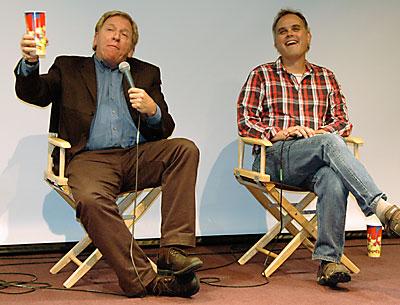The Politics of Polarization

On Saturday evening a large and lively crowd came to the Bay Street Theatre in Sag Harbor to see “Patriocracy,” a documentary about the political polarization of the country and how it has brought the functions of governing to a standstill.
The film was a special presentation by the Hamptons Take 2 Documentary Film Festival, which takes place in the fall. The festival brought both the filmmaker, Brian Malone, and Ken Rudin, an NPR political commentator, to lead a discussion after the screening.
The film considered some of the more divisive rhetoric uttered by both extremes of the political parties and examined the echo-chamber effect as the media captures these moments and the divisive energy in general to foment even more extremism. It showed how sometimes the simplest legislation cannot be passed due to partisan bickering and the role of special interest money, but it also offered some solutions.
Mickey Edwards, a former Republican congressman from Oklahoma, said he would like to take special interest money out of campaign contributions. “Only human beings should give money,” he said.
Howard Schultz, the founder of Starbucks, has called for a boycott of campaign contributions to either party until they work together to find solutions to fiscal policy.
Jim Cooper, a Democratic congressman from Tennessee, would like to see members of Congress be paid by performance, a longer work week for Congress, and campaign finance reform. He also suggested that the Speaker of the House position be one elected by both parties with a 60 percent majority necessary to win the post.
Reasonable time limits on approving presidential appointments, open primaries in every state, and Internet voting were some other options suggested to fix the political process.
Mr. Rudin said he did not agree with everything in the film, but agreed that both parties had contributed to the poisonous atmosphere over the past two decades. One audience member asked if some of the incivility expressed toward the President stemmed from racism. “To dismiss racism’s role would be naïve,” Mr. Rudin said, “but it is only one other reason” for people who don’t like the President to feel as they do.
He also acknowledge NPR’s role, along with the rest of the media, in turning election discussions into a horse race rather than instructive reporting on where each candidate actually stands on the issues.
